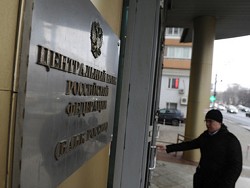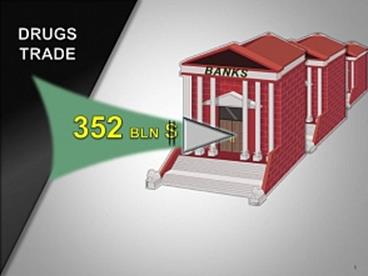
The Central Bank is going to mitigate the requirements for control of the banks for clients in terms of transactions falling under mandatory control in the sphere of combating money laundering and legalization of incomes, and access to databases of government agencies to identify clients, reported the media.
Draft amendments to two laws – 115-FZ (on countering the legalization (laundering) of income obtained by criminal means and financing of terrorism) and the law on state registration of legal entities and individual entrepreneurs was prepared by the Central Bank on the basis of proposals of bankers and sent for inspection to the market participants told Kommersant.
As follows from the amendments, they primarily facilitate the interaction of bankers with the Federal service for financial monitoring, the newspaper reports.
In particular, it is proposed to exempt banks from the formation of messages in transactions with real estate, precious metals, payment of insurance and leasing transactions. Now banks will only notify the service about the transactions by debiting and crediting funds in the framework of such transactions. Now banks must collect information about the transaction (receipt of confirmation from the registering authority the fact of transfer of ownership and collection of a large amount of information on it, mostly in manual mode).
The operation transaction is a direct movement of funds on the client’s account, and keep track of them, and hence to inform the Federal financial monitoring service can automatically. Follow by the transactions and inform the Federal financial monitoring service will be the only specialized financial institutions (for the tracing of transactions with precious metals will be responsible pawn shops, for the payment of insurance – insurers and so forth). “In fact, we are talking about the separation of reporting among market participants depending on their competencies,” explains co-Chairman of the ARB Committee Alexey Timoshkin.
In addition, out-of-control displays of the transaction Bank in the interbank market. “Still the question of whether to inform on interbank transactions in the amount over 600 thousand roubles, was discussion, the amendment he withdrawn, which reduces the load on the Bank”,– said one of interlocutors of the edition.
Another relief due to amendments to the Civil code, which forced many organizations to change the form of ownership for PJSC. Now this reorganization, in fact, makes a new company that requires the Bank informed of its financial operations for the sum over 600 thousand roubles. Now the reorganization of a legal entity in the form of a merger or conversion under this case is not covered.
Despite the overall liberal orientation of the project, one tightening it still contains. We are talking about the transactions on granting the interest-free loans.
According to experts, this tightening aimed at combating corruption.
If the current law focuses on providing interest-free loans that do not have obvious economic sense – from legal entities to individuals, now subjects of the control will be and individuals. “A bribe does not necessarily give the company the bribe-giver can be a citizen, but still special not attached”, – said the interlocutor of the edition from among the bankers.
According to experts, in case of acceptance of amendments the number of daily sent to Rosfinmonitoring of messages will be reduced in hundreds times. In 2015, the total number of messages amounted to about 10 million units.
From bankers expect innovation and cost reduction for missed deadlines for notification of the Rosfinmonitoring. To inform the service about the transactions subject to mandatory control, banks shall, within three days from the moment of its implementation, says the source in the Bank of top-30. To confirm this fact the Bank needs the information from the registering body, which takes more than three days. If banks will only inform about operations that might affect the period of time for transmission will be reduced.
Another set of amendments must give banks the right to use databases of government agencies to identify corporate clients. For example, to obtain data on number, date of issue and organ that issued the customer representative’s passport and the place of residence of the entrepreneur. And to reply to the Bank inquiry, the public body will be required during the day, instead of five as it is the procedure of its interaction with other state agencies now.
“This is a very limited set of data, and would not rule out a submission by the client of the original passport, but at least gives banks the opportunity to verify the authenticity of his document,” notes Timoshkin.
According to sources, after it is discussed with market participants before the end of March, it will be submitted to the government, and then to the state Duma.
The Federal financial monitoring service reported that in the near future to submit to the government such a project do not plan to, but not refuse from “careful consideration of the issues raised”.
The Central Bank said that at this stage additional comments premature: “These legislative changes currently being discussed only at the expert level.”








